 |
|

In May, I gave my first speech on the Senate floor, where I outlined the four policy priorities that will guide my season of service in the United States Senate. I’m taking this month to share each of these priorities in more detail and how I’m working to move them forward.
To my colleagues in the Senate from the East, it may be hard to grasp just how deeply federal overreach affects daily life in Utah. In some counties, more than 90% of the land is owned and controlled, not by local leaders or communities, but by a distant, federal government. I saw this again this week in Morgan County. Ninety percent of their land is federally owned. As a former mayor, I know what it means to try to balance a budget, build a tax base, and grow responsibly. But how do you grow a community, how do you create opportunity, when 90% of your land doesn’t generate property tax? How do you plan for the future when most of your land is off-limits by federal decree?
For our rural communities to thrive, they have to be in control of their own destiny. That doesn’t mean we ignore the federal government, but it does mean Washington should stop ignoring us.
I often say the best environmentalists in the world are Utah’s farmers and ranchers. Some are shocked when I say that, but it’s true. They live closest to the land, and they have protected it for generations.
One of the proudest moments of my time in Congress was passing the Emery County Public Land Management Act. We brought local officials, ranchers, conservationists, Native American tribes, recreation groups, and industry to the same table and proved something Washington rarely does: real consensus. And this year, standing with Interior Secretary Doug Burgum, BLM leadership, and Governor Spencer Cox, we signed the Record of Decision that put those agreements into action—finalizing the transfer of nearly 100,000 acres to Utah to support our kids and our classrooms.
What did that mean on the ground? It meant establishing the San Rafael Swell Recreation Area and creating Jurassic National Monument—protecting iconic places while expanding access. It meant growing Goblin Valley State Park and putting targeted conservation where it belongs. It meant multi use—preserving grazing, improving recreation, and unlocking energy and economic opportunity. And it meant new revenue for Utah schools for years to come.
If Congress is serious about protecting the West, and we are serious about supporting our local communities, then it’s time to stop treating Utah like a national park and start treating it like what it is: a living, working place full of families, communities, and opportunity.
We don’t want to be managed. We want to be trusted. We want stewardship, not control.


|
|

For too long, decisions about Utah’s lands have been dictated by Washington instead of the people who know them best. This past February, Senator Curtis joined Secretary of the Interior Doug Burgum, Acting Bureau of Land Management Director Jon Raby, and Utah Governor Spencer Cox in signing a land transfer agreement bringing nearly 100,000 acres of federally managed land to Utah. First introduced in 2019 by then-Representative Curtis, it is expected to help generate millions of dollars to support Utah’s schools.
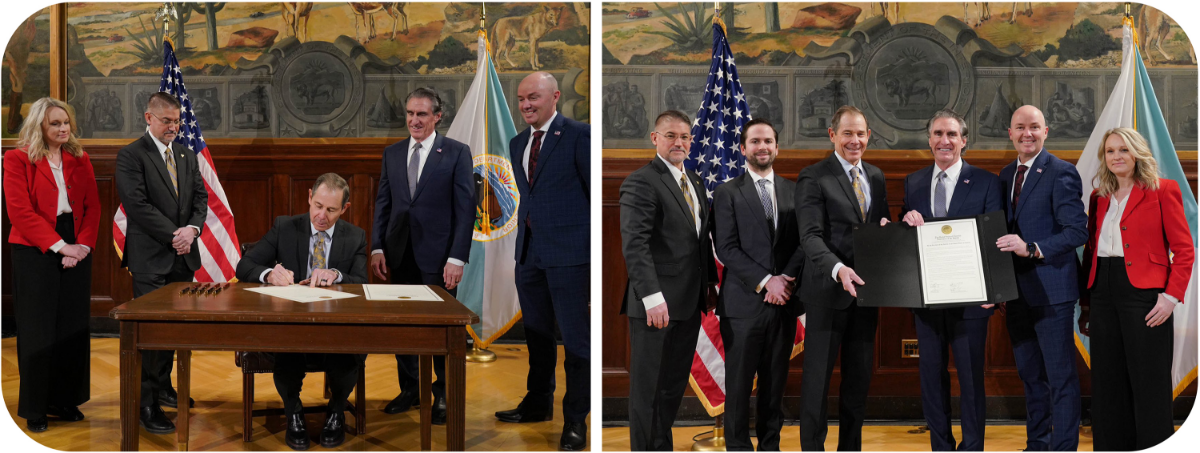
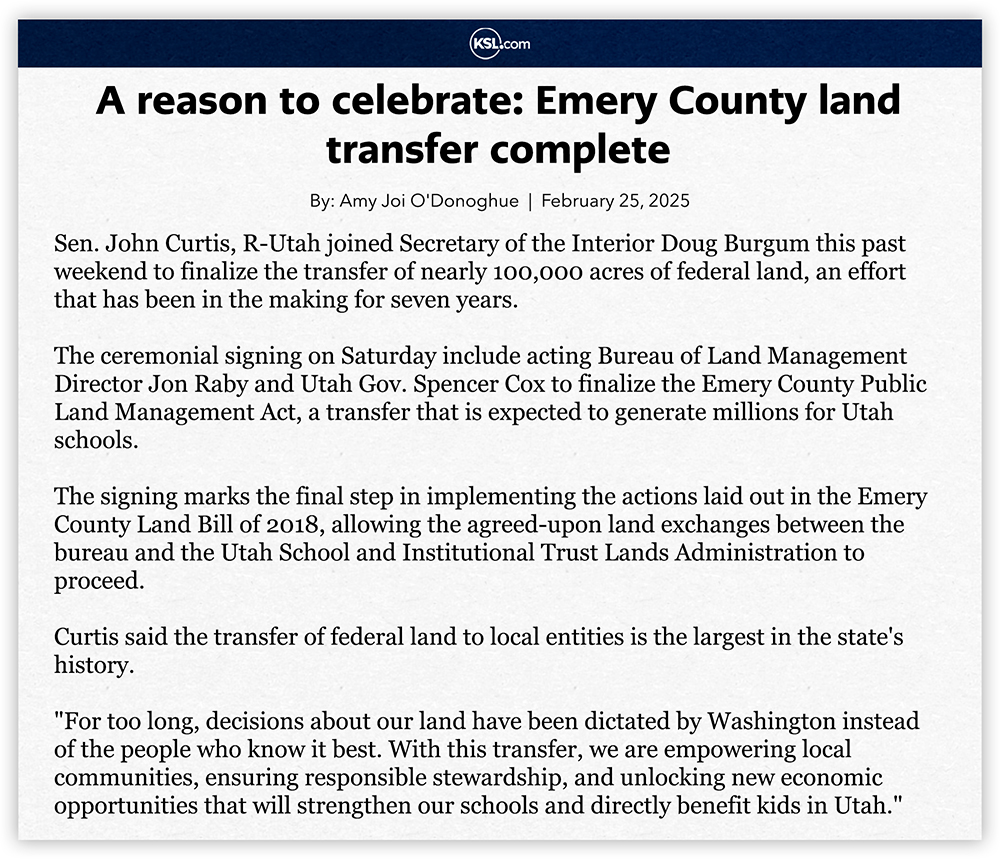
Full story by Amy Joi O'Donoghue here.

Senators Curtis and Lee (R-UT) introduced the Star-Spangled Summit Act, a bill to authorize a special-use permit allowing the American flag to be flown on Kyhv Peak above Provo, Utah. Rep. Kennedy (R-UT) introduced companion legislation in the House of Representatives.
For over two decades, Utah native Robert Collins has made the seasonal trek up Kyhv Peak, formerly known as Squaw Peak, to proudly display the flag of the United States. In 2021, the Forest Service informed Collins that his long-standing tribute was inconsistent with agency policy prohibiting structures or improvements on National Forest System lands without a special-use authorization. The Star-Spangled Summit Act would resolve this impasse by requiring the Forest Service to issue a permit for this one, specific and symbolic act of patriotism.
Utahns are among the most patriotic people in the country. It shouldn’t take an act of Congress to allow an American flag to fly on a mountain peak, but here we are. This is about more than red tape—it’s about recognizing that local traditions, patriotism, and common sense still matter. Robert’s quiet, consistent act of honoring our country deserves to be celebrated, not blocked by bureaucracy.

Careful stewardship of our lands is a core part of Utah’s legacy and its values. Senator Curtis applauded the Department of Agriculture for repealing a rule that was prohibiting wildfire mitigation practices. Now, nearly 60% of forest service land in Utah can be utilized for responsible fire management.
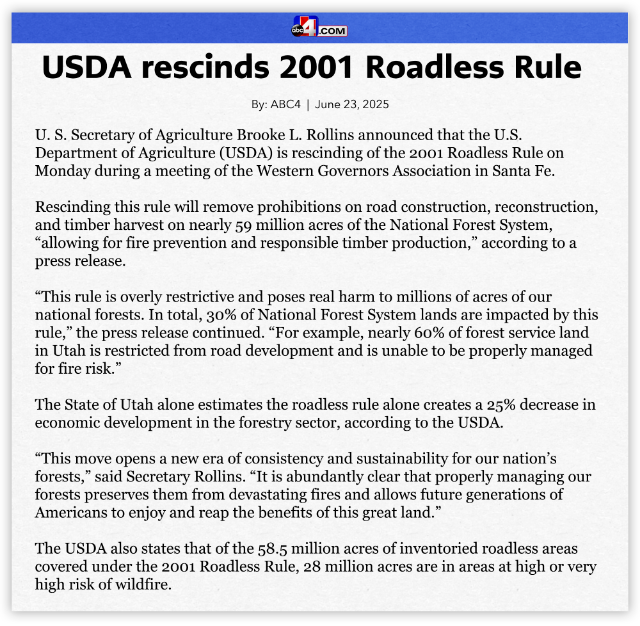
Full story by ABC4 here.

Restoring off-road access in the Glen Canyon National Recreation Area is an important step to ensure our public lands remain open to the people—not closed off by Washington bureaucrats. President Trump signed into law a resolution introduced by Senator Curtis, Representative Maloy (R-UT) and Senator Lee (R-UT) to restore access to approximately 24 miles of park roads in the area of Glen Canyon known as the Orange Cliffs Special Management Unit for off-road vehicle use.
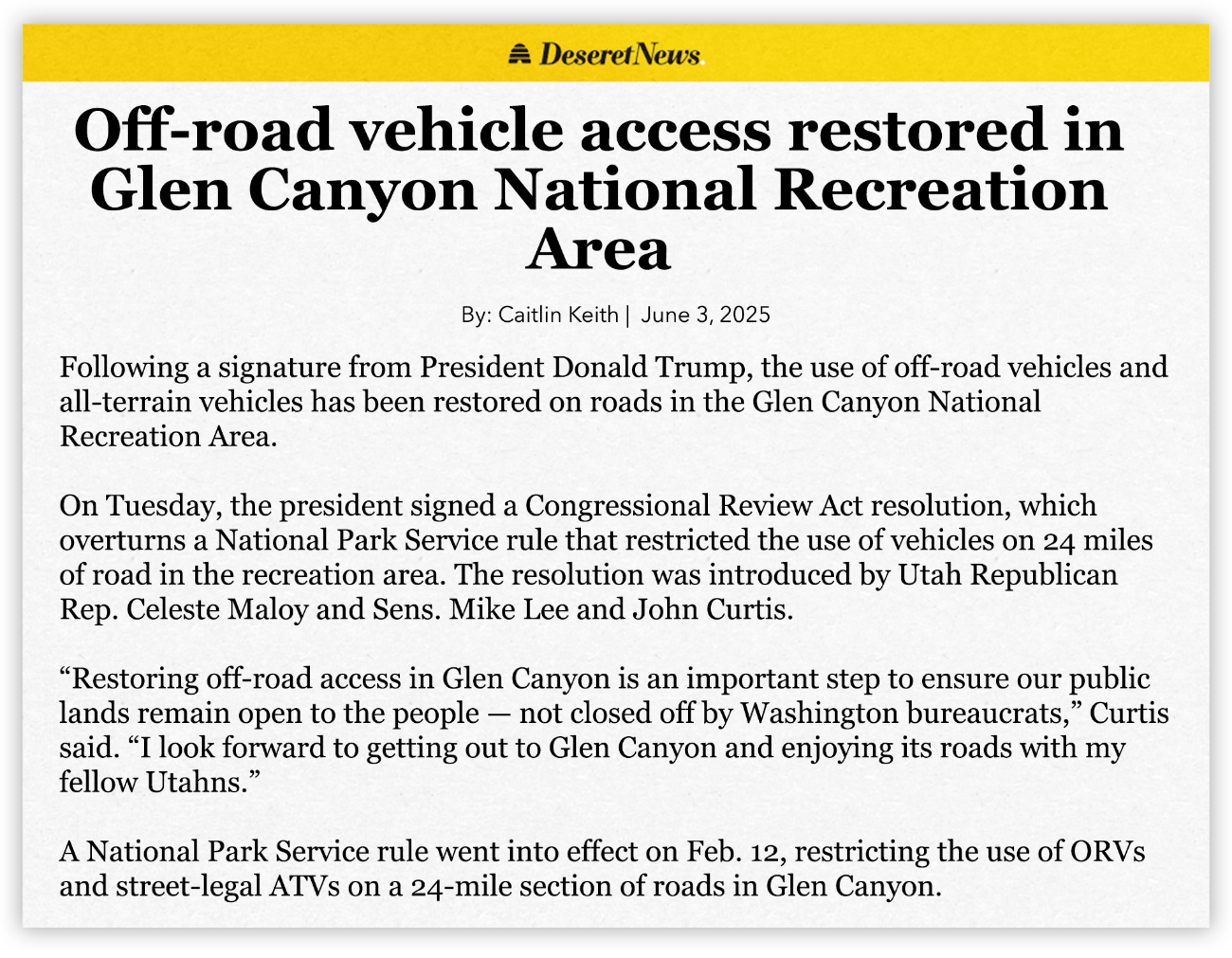
Full story by Caitlin Keith here.

|

Senator Curtis visited with Strider Technologies, answering questions from employees and their leadership about the growing threats from China. The conversation covered everything from stolen intellectual property to strategic influence campaigns, and the need for America to be unified and unafraid to act. Utah innovators are on the front lines of this fight, and he’s committed to making sure Washington has their back.


Senator Curtis met with the R6 Regional Council. He emphasized that partnering with local governments is essential and expressed gratitude for the strong relationship they continue to build on.


Senator Curtis hosted a town hall with the Sanpete County Chamber of Commerce, which represents more than 100 small businesses. He was grateful for the opportunity to hear directly from local leaders about both the opportunities and challenges they face.
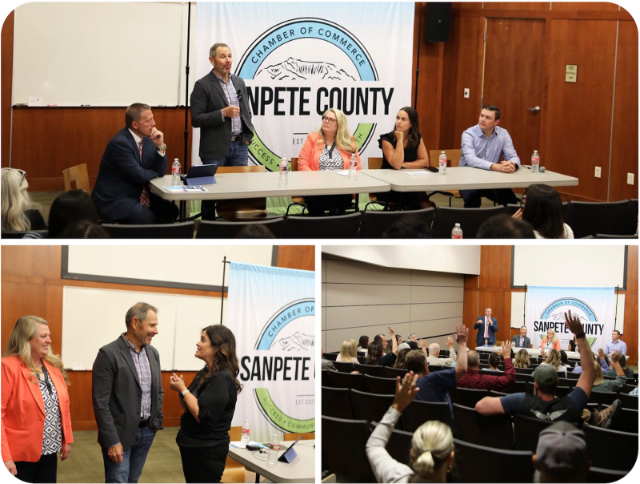

Applications are now open for the 2026 U.S. Senate Youth Program! Senator Curtis encourages Utah high school juniors and seniors involved in student government to apply for this prestigious opportunity. Two students from each state will be selected to attend a week in Washington, D.C. from March 7–14, 2026, where they’ll meet with their U.S. Senators, the President, Cabinet Secretaries, a Justice of the Supreme Court, senior members of the national media and other key policymakers. Each delegate also receives a $10,000 college scholarship.
Students must hold an elected or appointed leadership position and reside in the state where they attend school. For more information and to apply, visit ussenateyouth.org or contact your school counselor.

|

Senator Curtis received an update from the U.S. Forest Service on the Monroe Canyon Fire. They discussed how legislation like his Fix Our Forests Act can help better protect our communities and manage our forests.
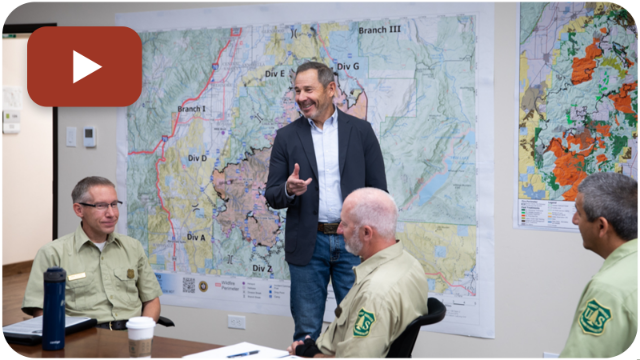

|
|

When tax refunds are delayed, it can be difficult to get answers from the IRS. One constituent recently turned to Senator Curtis’s office for help resolving a long-overdue refund—and with the support of our casework team, they finally received their funds. With their permission, we’re sharing their story to highlight how our office can assist with IRS issues.
.png)
If you can't get an answer from a federal agency in a timely fashion, or if you feel you have been treated unfairly, our office may be able to help resolve a problem or get you the information you need. While we cannot guarantee you a favorable outcome, we will do our best to help you receive a fair and timely response to your problem.


|

Registration is now open for the 4th Annual Conservative Climate Summit, which will take place on Friday, October 17, 2025, at the University of Utah. Visit curtis.senate.gov/ccsummit to secure your FREE ticket today!
Spots are expected to go quickly, so we encourage you to register as soon as possible. This year’s summit will feature leading voices in conservative climate solutions, interactive sessions, and networking opportunities with members of Congress, industry executives, and government leaders from across the country.
Our full speaker line-up and event program will be announced soon, so please stay tuned for more information
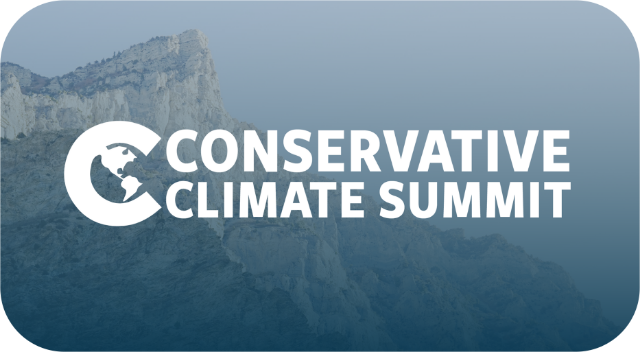

|
|

Why the coal industry remains vital in Utah and the West (Deseret News)
Trump administration deepens crackdown on solar and wind tax credits (Politico)

Unsubscribe |
|
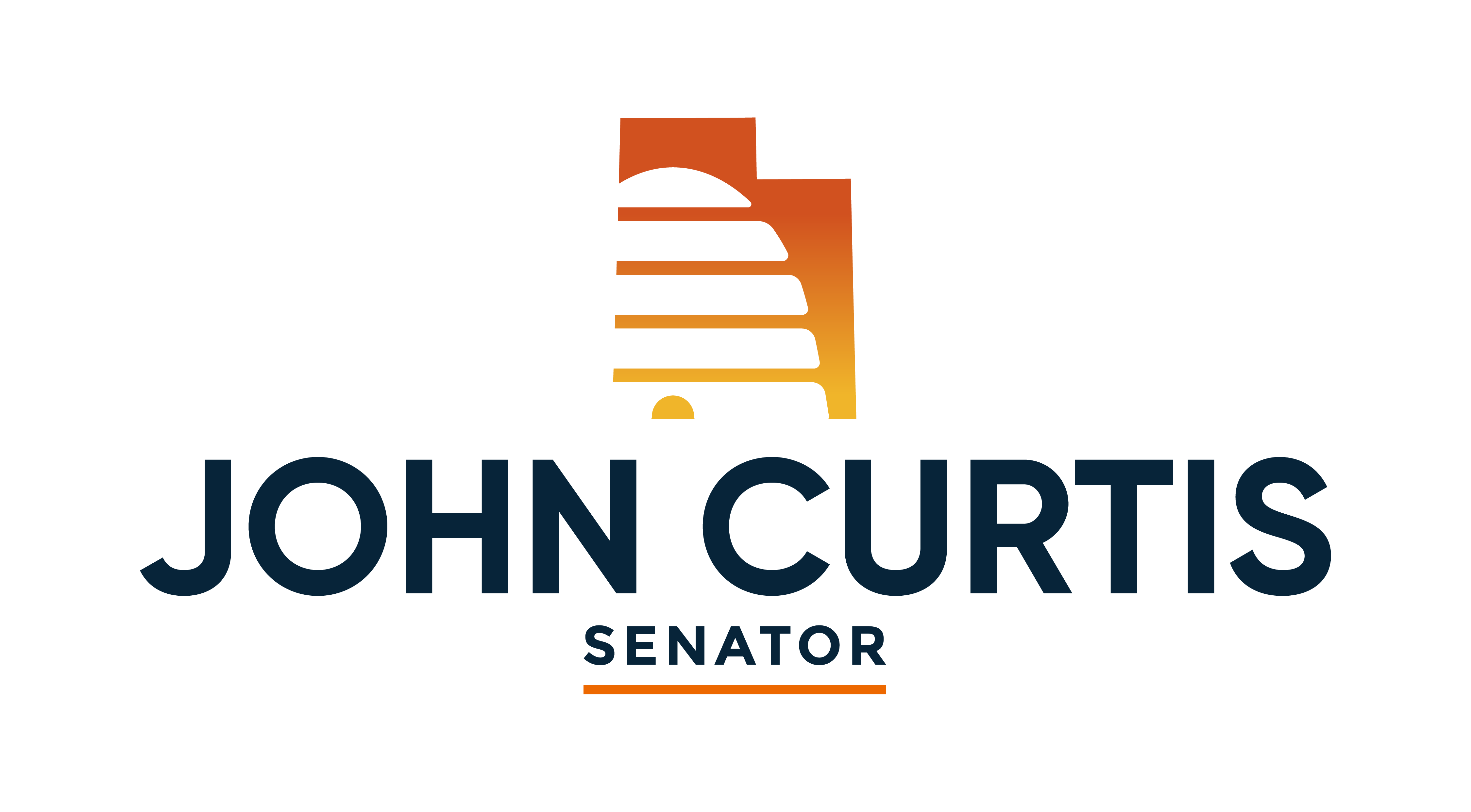 curtis.senate.gov curtis.senate.gov |
|
 
|
|